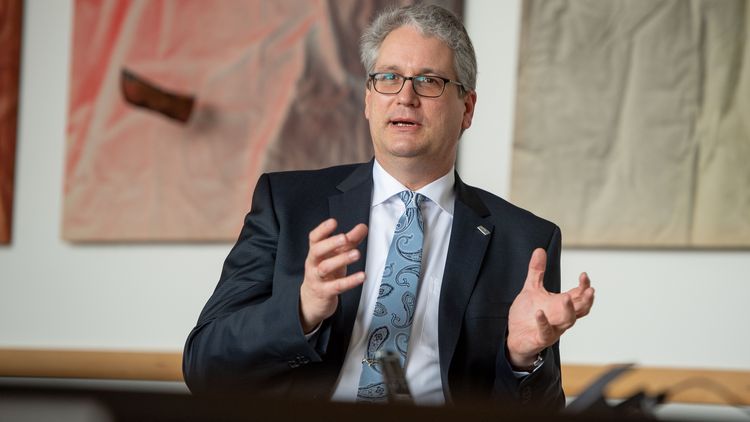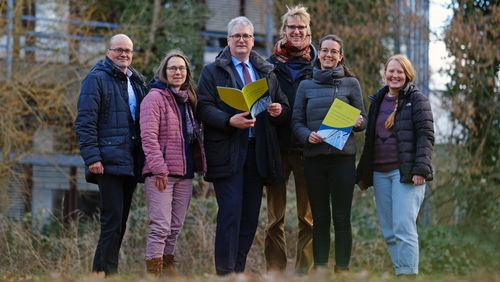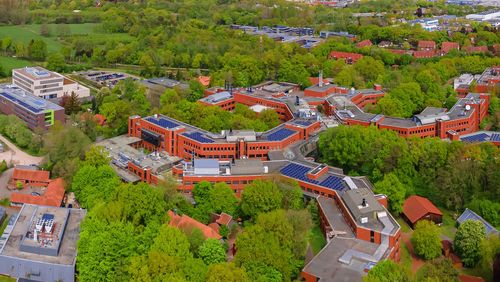Running a university at a time when energy resources are scarce is a challenging task. In this interview Jörg Stahlmann, Vice President of the university, talks about the top priorities for the winter semester and new opportunities regarding the university's goal of climate neutrality.
Many people have recently had to adjust – or more precisely, significantly increase – their monthly instalment payments for electricity and gas. What about the university?
We, too, pay our energy bills in instalments. With annual energy costs of around five million euros so far, we are currently paying about 450,000 euros per month...
Does this mean the university could soon be paying a million euros a month – or will the final reckoning come later, with the annual statement of accounts?
Private consumers seek out the contract with the most favourable terms and agree on a certain period of validity in order to have the security of a fixed price for the duration of that period. Fortunately, such a price-maintenance agreement also currently applies to the university. We are part of Lower Saxony’s state contract network, which means that the university is part of a state-wide call for tenders for both gas and electricity. The most recent tender took place at a time when prices were still low compared to today, so we needn’t reckon with a significant increase in our electricity bills until next year, and our gas contracts run until the end of 2023.
That is at least a bit of good news.
It certainly is. Of course, the additional costs resulting from a gas levy would also have affected the university, but this wouldn’t have made such a huge difference. This extra time during which the old contracts still apply and the price hikes don’t hit us full on gives us a bit of a head start. We must make the most of it and assess how to react to the expected tripling of energy prices. As a university, we will probably have to bear the brunt of the costs ourselves – probably with only partial compensation from the state.
What action is the university taking to reduce its gas and electricity consumption as much as possible – also in view of potential shortages?
Many large and small measures, some of which have already been implemented. Our advantage is that more than a decade ago we, as a university, started pushing ahead with energy-efficient renovations and the use of alternative energy sources such as photovoltaics. More than 80 percent of the suitable roof surfaces are already covered with photovoltaic panels, a percentage which far exceeds the legal requirements and puts us in first place state-wide and among the top ten nationwide in this respect. But above all, this is electricity that we won’t have to purchase at a high price in the future. These investments are proving all the more worthwhile in view of the rising energy prices. The problem we face now is that projects are stalled due to delivery problems, for instance the installation of new PV panels on the roof of the outdoor sports centre, which was scheduled for september.
At least the university has been able to keep its energy costs stable over the last few years with these measures…
Exactly, this clearly shows that the university has done its homework, so to speak, because the five-million-euro energy budget dates back to about 2010. The university has grown since then, yet we still manage with the same budget. Now it's a matter of completing other measures that have already been started, including a project funded by the Federal Ministry of Education and Research aimed at using waste heat from our computer centre as a heat source. We also want to continue the conversion to LED lighting, for example, as well as the energy-efficient renovation of university buildings and, above all, technology.
A crisis management committee was set up at the university last spring to deal with issue of energy. What exactly does it do?
We set up this committee when the issue first arose – just as we did when the Covid pandemic broke out. Certain faculties are represented on the committee, as well as the building management team, of course. The committee’s task is to go through potential scenarios with the various actors from the university. What counts as critical infrastructure in the various faculties? And what steps can be taken if we have to make further cutbacks in our energy consumption? But at least the Federal Network Agency (Bundesnetzagentur) stipulated a few weeks ago that universities are protected customers in the event of gas shortages – similar to hospitals, the fire brigade, key sections of public administration and private households.
That means that as long as gas is available the university will continue to receive supplies?
Exactly. Before this decision, the university would potentially have been one of the first institutions to have its gas supplies cut off. Of course, we may still have to adjust to a shortage or rationing at some point, along with everyone else. The energy-saving targets naturally apply to us, too.
To what extent are studies and in-person teaching a priority in the plans?
In-person teaching is a top priority for us this winter semester. We also have a social mandate for this. Our goal must be to give our students the possibility to attend courses here on campus and to stay on campus to learn. They have made enough sacrifices already due to the pandemic. What’s more, if everyone were now forced to study in their own heated homes, they would incur further high costs. As a matter of principle, we don’t consider this to be a good way of dealing with the situation, and we will do everything we can to avoid it. But it may, of course, become necessary for the university to offer courses only in certain buildings and to shut down other buildings in order to save energy. The crisis management committee is also responsible for deliberating such measures.
Must students, teachers and employees get used to the idea that they will soon be learning, teaching and working in cold rooms?
Not if we can avoid it, but the rooms will certainly be cooler, also due to the new legal requirements. I think lower room temperatures – if necessary – are a reasonable contribution. But the situation is not critical enough for us to cancel in-person courses or extend the winter break.
Many people have been making efforts to save energy for a long time now. Are there other steps that can be taken in everyday life at the university? Have you personally come across any good tips?
We’re being bombarded with energy-saving tips at the moment, many of them well-known. One point I personally have reassessed, however, is the feel-good factor – my individual comfort zone. In other words, can I still work if the temperature in the office is two degrees lower, or swim in the university’s pool when the water is two degrees colder? That's a step we can all take. Otherwise: switch off the lights during the day, don't heat and ventilate rooms at the same time – we all stick to these rules already! We’ve also incorporated many such practices into our daily life at the university – these are measures that have long since become a habit. And those who have not yet internalized them can join in now.
You already mentioned a number of measures the university is taking to prepare for a future with significantly higher energy prices. What else can be done?
One option for further cutting costs would be to reduce the amount of space we manage. We have rented a lot of space, and every space we no longer need to rent means a reduction in consumption and the overall budget. The issue thus ties in with Covid, digitalization and new work opportunities. However, our goal is expressly not to cut costs by having staff work from home instead of from the university. But if staff are already switching to working from home – and a high proportion of them have or are doing so – then, conversely, we could say that everyone will have their own workplace here but there could be a greater emphasis on sharing office space or desks. This also ties in with an upcoming project of the university’s Presidential Board on the future of work. Large projects such as renovating the façades of Buildings A1 to A4 would also be advantageous for the energy budget – but for that we would need an investment programme.
So even though the price trend is still manageable for the university at the moment, you’re saying there is a lack of compensation for the rising costs from the state of Lower Saxony on the one hand, and a lack of investments in large energy measures that could ease the burden on the other. What is our university doing to draw attention to this problem in Hanover?
Tackling the backlog of investments in state buildings in general, and in university buildings in particular, is on the agendas of all the main parties in the current state election campaign to some degree. There is talk of special programmes. And the climate neutrality that we as a university are striving for is also a major topic – here, too, all the parties know that this can only be achieved through investments. If Lower Saxony wants to be a pioneer in this area, it will have to invest. At the same time, we are still grappling with the two-million-euro "global spending reduction" (“globale Minderausgabe”) – a permanent cut in our overall budget. We could expand on many projects: we use heat pumps in our primary day care centre, and we would like to extend this to the entire university. We’re also very focused on energy efficiency in the planning of the new medical facility. But we can only take further big steps if the financial framework is adequate.
You mentioned climate neutrality...
This is a central issue for us. All the things we do towards saving energy should not just be stopgap measures during the current energy crisis, but also future-oriented. This situation is catapulting us forwards on the issue of climate neutrality. Many measures help us to move a little closer to this bigger goal. It would be good if a more energy-efficient approach became permanently established. In this way, we could also gain a lot from the current crisis for the future.
Interview: Deike Stolz






